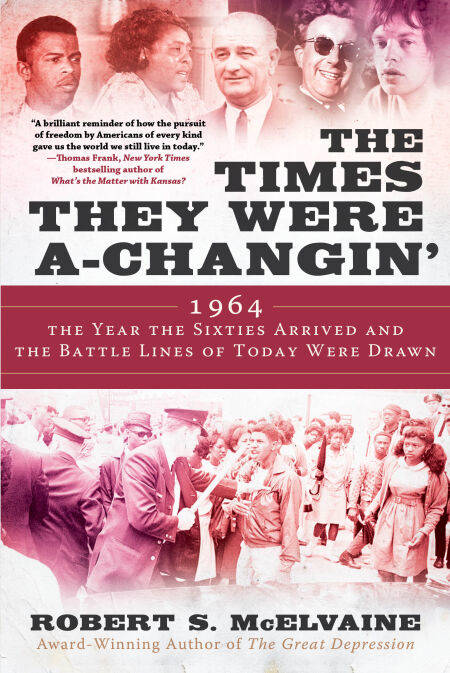
- Retrait gratuit dans votre magasin Club
- 7.000.000 titres dans notre catalogue
- Payer en toute sécurité
- Toujours un magasin près de chez vous
- Retrait gratuit dans votre magasin Club
- 7.000.0000 titres dans notre catalogue
- Payer en toute sécurité
- Toujours un magasin près de chez vous
The Times They Were a-Changin' EBOOK
1964, the Year the Sixties Arrived and the Battle Lines of Today Were Drawn
Robert S McElvaine
Ebook | Anglais
22,36 €
+ 22 points
Format
Description
An award-winning historian on the transformative year in the sixties that continues to reverberate in our lives and politics—for readers of Heather Cox Richardson.
If 1968 marked a turning point in a pivotal decade, 1964—or rather, the long 1964, from JFK’s assassination in November 1963 to mid-1965—was the time when the sixties truly arrived. It was then that the United States began a radical shift toward a much more inclusive definition of “American,” with a greater degree of equality and a government actively involved in social and economic improvement.
It was a radical shift accompanied by a cultural revolution. The same month Bob Dylan released his iconic ballad “The Times They Are a-Changin’,” January 1964, President Lyndon Johnson announced his War on Poverty. Spurred by the civil rights movement and a generation pushing for change, the Civil Rights Act, the Voting Rights Act, and the Immigration and Nationality Act were passed during this period. This was a time of competing definitions of freedom. Freedom from racism, freedom from poverty. White youth sought freedoms they associated with black culture, captured imperfectly in the phrase “sex, drugs, and rock ’n’ roll.” Along with freedom from racist oppression, black Americans sought the opportunities associated with the white middle class: “white freedom.” Women challenged rigid gender roles. And in response to these freedoms, the changing mores, and youth culture, the contrary impulse found political expression in such figures as Barry Goldwater and Ronald Reagan, proponents of what was presented as freedom from government interference. Meanwhile, a nonevent in the Tonkin Gulf would accelerate the nation's plunge into the Vietnam tragedy.
In narrating 1964’s moment of reckoning, when American identity began to be reimagined, McElvaine ties those past battles to their legacy today. Throughout, he captures the changing consciousness of the period through its vibrant music, film, literature, and personalities.
If 1968 marked a turning point in a pivotal decade, 1964—or rather, the long 1964, from JFK’s assassination in November 1963 to mid-1965—was the time when the sixties truly arrived. It was then that the United States began a radical shift toward a much more inclusive definition of “American,” with a greater degree of equality and a government actively involved in social and economic improvement.
It was a radical shift accompanied by a cultural revolution. The same month Bob Dylan released his iconic ballad “The Times They Are a-Changin’,” January 1964, President Lyndon Johnson announced his War on Poverty. Spurred by the civil rights movement and a generation pushing for change, the Civil Rights Act, the Voting Rights Act, and the Immigration and Nationality Act were passed during this period. This was a time of competing definitions of freedom. Freedom from racism, freedom from poverty. White youth sought freedoms they associated with black culture, captured imperfectly in the phrase “sex, drugs, and rock ’n’ roll.” Along with freedom from racist oppression, black Americans sought the opportunities associated with the white middle class: “white freedom.” Women challenged rigid gender roles. And in response to these freedoms, the changing mores, and youth culture, the contrary impulse found political expression in such figures as Barry Goldwater and Ronald Reagan, proponents of what was presented as freedom from government interference. Meanwhile, a nonevent in the Tonkin Gulf would accelerate the nation's plunge into the Vietnam tragedy.
In narrating 1964’s moment of reckoning, when American identity began to be reimagined, McElvaine ties those past battles to their legacy today. Throughout, he captures the changing consciousness of the period through its vibrant music, film, literature, and personalities.
Spécifications
Parties prenantes
- Auteur(s) :
- Editeur:
Contenu
- Nombre de pages :
- 480
- Langue:
- Anglais
Caractéristiques
- EAN:
- 9781950994120
- Date de parution :
- 06-06-22
- Format:
- Ebook
- Protection digitale:
- Adobe DRM
- Format numérique:
- ePub

Les avis
Nous publions uniquement les avis qui respectent les conditions requises. Consultez nos conditions pour les avis.






